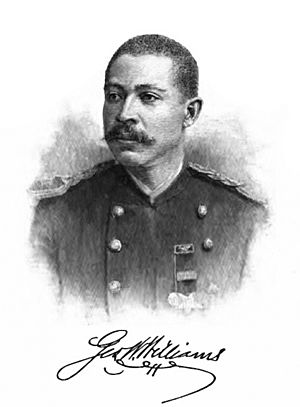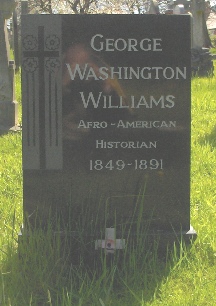George Washington Williams facts for kids
Quick facts for kids
George Washington Williams
|
|
|---|---|
 |
|
| Born | October 16, 1849 |
| Died | August 1, 1891 (aged 41) |
| Nationality | American |
| Occupation | Soldier, Minister, Historian, Lawyer, Journalist |
| Religion | Baptist |
George Washington Williams (October 16, 1849 – August 2, 1891) was an important American figure. He was a soldier in the American Civil War and in Mexico. Later, he became a Baptist minister, a politician, a lawyer, a journalist, and a writer. He is especially known for his writings about African-American history.
Williams served in the Ohio House of Representatives. In the late 1880s, he became interested in Europe and Africa. He met King Leopold II of Belgium and was impressed. In 1890, he traveled to the Congo Free State, which was then owned by the king.
What he found there shocked him. He saw widespread cruel treatment and slavery forced upon the Congolese people. In 1890, he wrote an open letter to King Leopold. This letter described the terrible suffering of the people in the Congo. It also helped make the term "crimes against humanity" well-known. His letter helped start an international protest against the king's rule in the Congo. This rule had caused millions of deaths.
Contents
Life and Work
Early Life and Military Service
Williams was born free in 1849 in Bedford Springs, Pennsylvania. His parents, Thomas and Ellen Rouse Williams, were African Americans. The state of Pennsylvania had ended slavery after the American Revolution.
George was the oldest of four children. His brothers were John, Thomas, and Harry Lawsom Williams. The boys did not get much schooling. For a time, Williams lived in a "house of refuge." There, he learned barbering, which was a useful skill back then.
During the American Civil War, Williams ran away to join the Union Army. He was only 14 years old and used a false name. He fought in some of the war's final battles.
After the war, Williams went to Mexico. He joined American soldiers who were helping to overthrow Emperor Maximilian. He became a lieutenant and learned some Spanish. He was known as a good gunner. He returned to the U.S. in the spring of 1867.
Back in the United States, Williams continued his military career. He joined the Army for five years. He was sent to the 10th Infantry in the Indian Territory. In 1868, he was wounded in a lung. He stayed in the hospital until he was discharged that same year.
Education and Family
After leaving the military, Williams decided to go to college. He was accepted at Howard University in Washington, DC. This is a historically black college. He did not stay there long.
In 1870, Williams began studying at the Newton Theological Institution near Boston, Massachusetts. In 1874, Williams became the first African American to graduate from Newton.
He met Sarah A. Sterrett in Chicago in 1873. They got married the next spring, after he graduated. They had one son together.
Religious and Political Career
After graduating, Williams became a Baptist minister. He served as a pastor in several churches. One of these was the famous Twelfth Baptist Church of Boston.
Williams also served as a pastor in Washington, DC. While there, he started a weekly newspaper called The Commoner. Many important leaders, like Frederick Douglass and William Lloyd Garrison, supported him. He published eight issues of the paper.
Williams and his family moved to Cincinnati, Ohio. He continued to preach there. He also studied law with a well-known firm. He passed the bar exam and became a lawyer.
Ohio State Legislature
Williams made history as the first African American elected to the Ohio state legislature. He served one term from Cincinnati, from 1880 to 1881. He proposed a bill that upset some of his voters. Because of this, he was not re-elected. His political career in the state ended quickly. He then focused on practicing law.
Williams was very good at starting new things after one path closed. This showed his strong spirit.
A Groundbreaking Historian
Williams' most important achievement was as a historian. He wrote important books about African Americans in the United States. His book, The History of the Negro Race in America 1619–1880, was published in 1882. It is seen as the first complete history of African Americans. It showed their involvement and contributions from the earliest days of the colonies.
In this book, Williams used the phrase "crime against humanity." He used it to describe the wrongness of slavery in the United States. This was one of the first times this term was used in its modern meaning. He also wrote A History of Negro Troops in the War of Rebellion (1887). This book was about the United States Colored Troops and African-American soldiers in the American Civil War.
Journey to Africa and the Congo
In 1889, Williams arranged to travel to Europe. He planned to write articles for a news agency. He had an informal meeting with King Leopold II of Belgium. At first, he was very impressed by the king. He became interested in visiting the Congo Free State. The king personally owned this area and talked about developing it.
Williams received support from President Benjamin Harrison's government. He traveled to the Congo in 1890. He was horrified by what he saw. The king used a private army to force the Congolese to produce rubber.
Speaking Out Against Injustice
From Stanley Falls, Williams wrote "An Open Letter to His Serene Majesty Leopold II, King of the Belgians and Sovereign of the Independent State of Congo." He wrote it on July 18, 1890. In this letter, he strongly criticized the cruel and inhumane treatment of the Congolese people. This treatment was done by Europeans and Africans working for the Congo Free State.
He mentioned the role of Henry M. Stanley, whom the King sent to the Congo. Stanley had tricked and mistreated local Congolese. Williams reminded the King that these terrible acts were done in his name. This made the King as guilty as those who committed the acts. He asked the world to "call and create an International Commission to investigate the charges herein preferred in the name of Humanity..."
The King and his supporters tried to make Williams look bad. But Williams kept speaking out about the abuses in the Congo Free State. His efforts helped create action in Belgium and around the world. Eventually, the Belgian government took control of the Congo Free State. They tried to improve how the Congolese were treated.
Later Life and Legacy
While traveling back from Africa, Williams became sick in Cairo. He traveled back to London. Williams died in Blackpool, England, on August 2, 1891. He died from tuberculosis and pleurisy. He is buried in Layton Cemetery, Blackpool.
In 1975, a tombstone was placed at his grave. An American historian and local supporters did this. It honors Williams as an "Afro-American historian."
Legacy and Honors
- In 1975, a tombstone was placed at Williams' grave in England. It recognized him as an "Afro-American historian."
- The George Washington Williams Memorial Room was named in his honor. It is on the first floor of the Ohio State House.
- The Ohio legislature ordered a video documentary about Williams. It is called George Washington Williams: A Portrait of Faith, Courage and Wisdom (2002).
- Samuel L. Jackson played a character based on Williams in the 2016 film The Legend of Tarzan.
See also
 In Spanish: George Washington Williams para niños
In Spanish: George Washington Williams para niños
 | Laphonza Butler |
 | Daisy Bates |
 | Elizabeth Piper Ensley |


